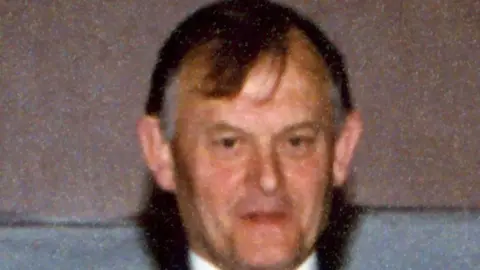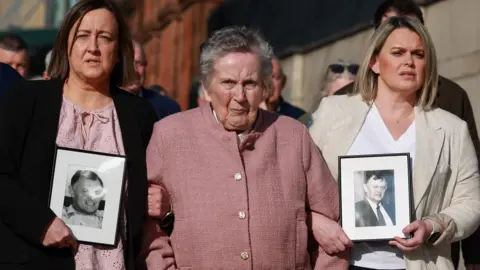BBC News NI crime and justice correspondent
 Pacemaker
PacemakerThe UK government’s refusal to hold a public inquiry into the murder of GAA official Sean Brown is unlawful, the Court of Appeal has ruled.
It has given Northern Ireland Secretary Hilary Benn four weeks to reconsider the matter.
Intelligence material has linked state agents to the 61-year-old’s murder by the Loyalist Volunteer Force in 1997.
He was abducted from outside a GAA club in Bellaghy, County Londonderry, and driven to Randalstown, in County Antrim, where he was shot six times in the head.
 PA Media
PA MediaThe government had taken a legal challenge, which attempted to overturn a decision by a court to order a public inquiry into the loyalist murder of Mr Brown.
Speaking after the hearing on Thursday, Mr Brown’s widow Bridie spoke directly to the Northern Ireland secretary of state: “Five judges have told you what to do, do the right thing and please don’t have me going to London.”
Mr Brown’s daughter Clare Loughran said they were “very pleased with the judgement”.
“He (Hilary Benn) has got very little further option, the fact that he was trying to get us to go towards the ICRIR and it’s been evident that is actually something that probably is not appropriate in my father’s case,” Ms Loughran said.
“I really hope that he has got some degree of credence in what the legal framework have so far told him what to do.
“I would appeal to the secretary of state to do the right thing.”
Delivering the Court of Appeal judgement on Thursday, Dame Siobhan said there should be “no further delay in this case”.
“This is a shocking state of affairs in that a quarter of a century has passed since Sean Brown was murdered and yet there has been no lawful inquiry into the circumstances of his death,” she said.
Dame Siobhan added: “An independent public investigation dealing with the coroner’s concerns, capable of dealing with sensitive material, with the Brown family legally represented, provided with the relevant material and able to examine the principal witnesses must be held without further delay in order to satisfy the obligations imposed by Article 2 of the European Convention on Human Rights, which all parties agree the UK Government is in breach of.”
Analysis: Public inquiry could be a step closer
The government looks cornered by this outcome.
A public inquiry is a step closer, but it is possible this ruling could be tested at the UK Supreme Court.
That would further delay things.
This is a significant case as it could have wider implications.
Families involved in a small number of other legacy cases are watching closely.
They believe their circumstances also merit inquires.
The ruling also underlined problems with the legacy body, the Independent Commission for Reconciliation and Information Recovery (ICRIR), which the government has promised to correct.
When that will happen is unclear.
Sean Brown: Abducted from the gates of GAA club
Mr Brown was locking the gates of GAA club Bellaghy Wolfe Tones when he was kidnapped by the paramilitary grouping, the Loyalist Volunteer Force (LVF).
Early last year, a court heard that more than 25 people, including state agents, had been linked by intelligence material to Mr Brown’s murder.
Last March, a coroner said Mr Brown’s inquest could not continue due to material being withheld on the grounds of national security.
He decided that redactions of intelligence material meant he could not properly investigate the circumstances of the killing.
Instead, he wrote to the then Northern Ireland Secretary Chris Heaton-Harris, requesting a public inquiry into the case.
In December, the High Court ruled that current Northern Ireland Secretary Hilary Benn must set up a public inquiry into the murder.



